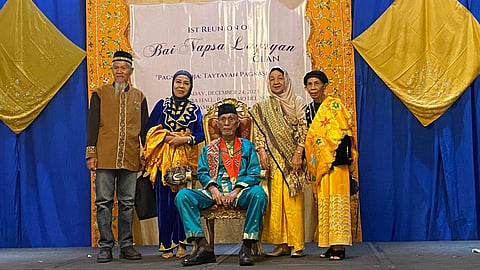
- NEWS
- the EDIT
- COMMENTARY
- BUSINESS
- LIFE
- SHOW
- ACTION
- GLOBAL GOALS
- SNAPS
- DYARYO TIRADA
- MORE

Cagayan de Oro City — The Mindanao and Sulu Unification Movement (MSUM) has sought a review of the newly approved maritime law to include the sentiments, aspirations, and advocacy of stakeholders in Sulu and Tawi-Tawi, particularly concerning their ancestral rights.
Abraham Idjirani, MSUM spokesperson, stated that the maritime law, sponsored principally by Senate Majority Leader Senator Francis Tolentino and signed into law by President Ferdinand R. Marcos Jr. on 8 November 2024, was crafted and deliberated without consulting stakeholders, especially the Sultanate of Sulu.
“The maritime bill, now part of Philippine law, is connected to the historical rights and interests of people in the archipelagic circle of the Sulu Archipelago. A hearing, while it was still a bill, should have been brought to Sulu and Tawi-Tawi, similar to what President Marcos Jr. did as a senator in 2014 during discussions on the Bangsamoro Organic Law, amid opposition from the Bangsa Suluk people,” Idjirani said.
Idjirani added that the Sultanate of Sulu, headed by the 35th Sultan Phugdalun Kiram II, lamented the description of the law as a landmark victory, stating that it benefits only those who continue to embrace the political designs of the Recto-Quirino Colonization Act.
The assertion of two landmark laws on territorial integrity and rights over all maritime zones, including the West Philippine Sea, infringes on the historical rights of the Sultanate of Sulu and the Bangsa Suluk Nation.
He further stated that the Sultan of Sulu has expressed a strong position regarding the intent and territorial jurisdiction declared under the 12 June 1898 Declaration of Philippine Independence in Kawit, Cavite. At that time, the Sultanate of Sulu or the Bangsa Suluk Nation was exercising independent sovereignty over its territories, including the Sibutu Sea, as emphasized in the maritime law.
The redefinition of territorial integrity and rights, now enshrined in Philippine laws, can be contested by the 1915 Kiram-Carpenter Agreement signed between the United States and the Sultanate of Sulu.
Idjirani emphasized that the territorial jurisdiction and rights of the Sultanate of Sulu were not incorporated into the Philippines by virtue of the 12 June 1898 Declaration of Independence, the 1898 Treaty of Paris, or the 7 November 1900 Cession of Sulu and its islands. Spain, a signatory to the Treaty of Paris, did not exercise de facto governance over the Sultanate of Sulu or North Borneo and had no title of sovereignty over these territories.
He pointed out that the Philippines’ claim to these territories under the two maritime laws stems from the 1915 Kiram-Carpenter Agreement, signed during the American occupation.
By this agreement, the United States assumed sovereign power and authority to incorporate these territories into the Philippines in 1935. This incorporation was formalized after the transitional period outlined in the 1934 Tydings-McDuffie Law, becoming part of the Philippine national boundary on 4 July 1946, when the United States granted independence to the Third Republic of the Philippines.
According to Idjirani, the Kiram-Carpenter Agreement assured the Sultan of Sulu and North Borneo full protection should disputes arise with any foreign authority. The agreement also committed the United States to place the Sultanate of Sulu and North Borneo under its protectorate and flag.
“To this day, the United States has not passed a Congressional Act to abrogate the 1915 Kiram-Carpenter Agreement. The United States is morally bound and legally obligated to rectify the historical wrongs inflicted upon the Sultanate of Sulu, North Borneo, and the Bangsa Suluk people,” Idjirani said.
Idjirani concluded that while the Philippine maritime law strengthens the country’s territorial claims, it also underscores the need for dialogue to respect the ancestral territories and historical rights of the Sultanate of Sulu and the Bangsa Suluk Nation.
